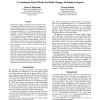Free Online Productivity Tools
i2Speak
i2Symbol
i2OCR
iTex2Img
iWeb2Print
iWeb2Shot
i2Type
iPdf2Split
iPdf2Merge
i2Bopomofo
i2Arabic
i2Style
i2Image
i2PDF
iLatex2Rtf
Sci2ools
122
click to vote
AAAI
2000
2000
A Consistency-Based Model for Belief Change: Preliminary Report
We present a general, consistency-based framework for belief change. Informally, in revising K by , we begin with and incorporate as much of K as consistently possible. Formally, a knowledge base K and sentence are expressed, via renaming propositions in K, in separate alphabets, but such that there is an isomorphism between the original and new alphabets. Using a maximization process, we assume that corresponding atoms in each language are equivalent insofar as is consistently possible. Lastly, we express the resultant knowledge base using just the original alphabet. There may be more than one way in which can be so extendedby K: in choice revision, one such "extension" represents the revised state; alternately revision consists of the intersection of all such extensions. The overall framework is flexible enough to express other approaches to revision and update, and the incorporation of static and dynamic integrity constraints. Our framework differs from work based on ordi...
Related Content
| Added | 01 Nov 2010 |
| Updated | 01 Nov 2010 |
| Type | Conference |
| Year | 2000 |
| Where | AAAI |
| Authors | James P. Delgrande, Torsten Schaub |
Comments (0)

